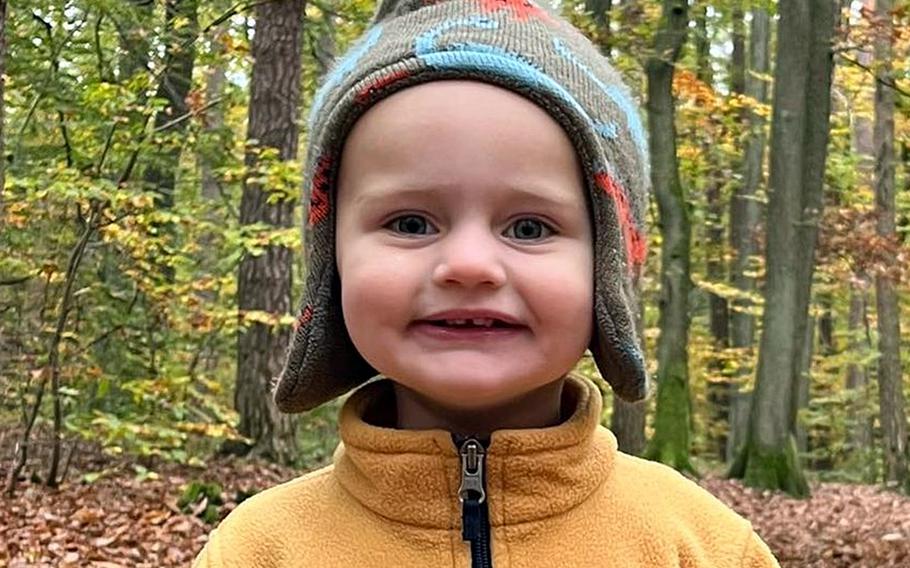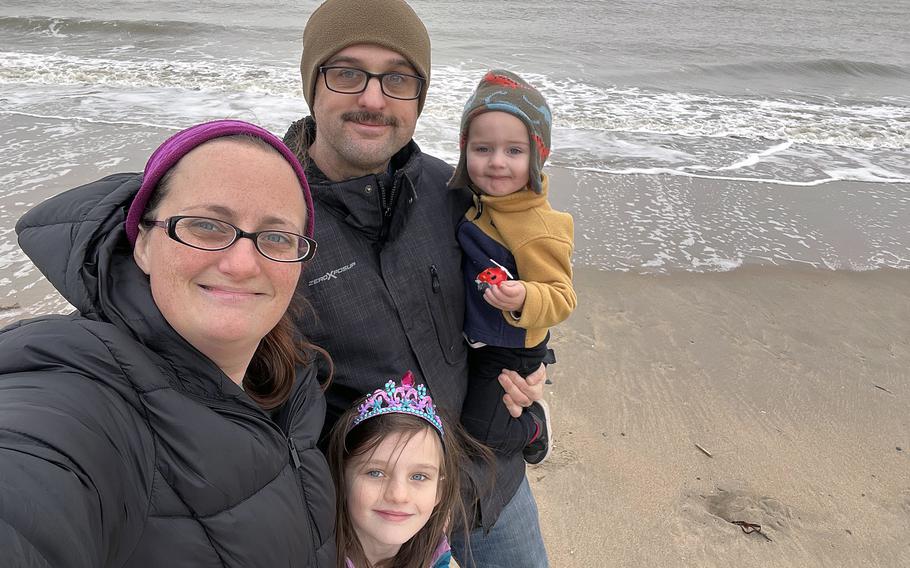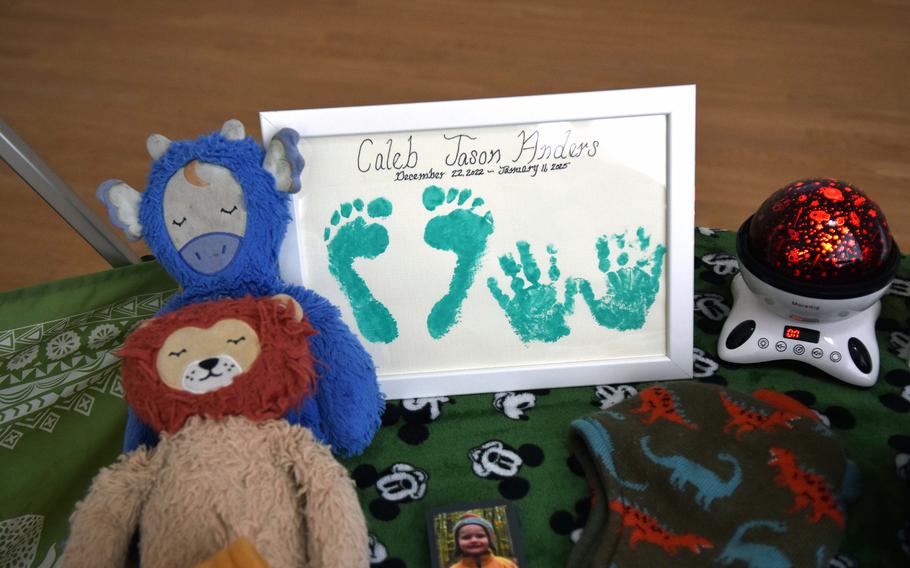
Caleb Anders was a boisterous, healthy boy before he died from bacterial meningitis on Jan. 11, 2025, at the age of 2. (Jordan Anders)
KAISERSLAUTERN, Germany — The day before New Year’s Eve, the Anderses took their ailing toddler to the Ramstein base medical clinic.
It was Jordan and Jason Anders’ third visit in four days to military doctors as they desperately tried to figure out what was wrong with 2-year-old Caleb. For more than a week, their child had a fever, was lethargic and uninterested in eating.
The Anderses were told to give him fluids and see how he responds, said Jason Anders, a U.S. Air Force technical sergeant and aircraft maintainer assigned to Ramstein.
Twelve days later, on Jan. 11, the Anderses, along with Caleb’s then-6-year-old sister, Bailey, said their final goodbyes to their once-boisterous boy at a German hospital in Homburg. Caleb died from complications caused by pneumococcal meningitis.
It’s impossible to know whether Caleb would have survived if he had been diagnosed sooner. Pneumococcal meningitis, a bacterial infection that causes the protective lining of the brain and spinal cord to swell, can be fatal or cause serious complications without rapid diagnosis and treatment.
As they continue to grieve, the Anderses regret not pushing harder to get Caleb the care he needed and question why military doctors sent them home three times over the span of four days when their son clearly was not well.
They hope the lessons learned by Caleb’s case help inform future care in the military health system when children are admitted with possible meningitis symptoms.
They also hope Caleb’s story helps make parents more knowledgeable about what to look for when it comes to bacterial meningitis and how to advocate for their children.
“We trusted the doctors and we didn’t keep pushing, and that’s something that I have to live with,” said Jordan Anders, Caleb’s mom. “I hope other people use our story to push more.”
The Anderses traveled to Spain’s Canary Islands on Dec. 20, a few days after a family bout with a stomach flu they thought had run its course. But two days later, Caleb developed a fever on his second birthday.
His parents took him to a hospital emergency room in Spain on Dec. 26 after he threw up for the second time in two days and his fever spiked to 104 degrees. Doctors detected inflammation in his bloodwork and attributed it to the lingering stomach ailment he had in Germany.
Caleb slept the entire flight home later that day. The next day, the Anderses took Caleb, now nursing a fever for a sixth straight day, to the emergency room at Landstuhl Regional Medical Center, the largest Defense Department hospital overseas.
After reviewing what Caleb had done in Spain, ER personnel also attributed his symptoms to the same stomach flu and “told us that the fevers aren’t concerning just yet,” Jordan Anders said, adding that the clinicians recommended pain reliever medication.
Two days later, on the evening of Dec. 29, the family was back at the hospital. Caleb was still lethargic, with a fever averaging 102 to 103 degrees. He didn’t want to walk or eat.
“I’ve never seen a kid sleep so much,” Jordan Anders said.
Lab work indicated a low sodium level but otherwise nothing alarming.
“They told us to add a little salt in his water,” Jordan Anders said.
The military doctor at LRMC examining Caleb mentioned for the first time the possibility of meningitis and suggested testing for it, she said.
The only definitive test for meningitis is a lumbar puncture, also known as a spinal tap. It involves insertion of a needle into the lower back to remove a sample of cerebrospinal fluid to test for bacteria.
But the doctor wasn’t 100% convinced it was meningitis, Jordan Anders said, and the parents decided to wait, concerned that the procedure might be painful for Caleb.
“We all agreed that if his symptoms looked worse the next day, we would come back,” Jordan Anders said.
The following day, Dec. 30, the Anderses took Caleb to the Ramstein base medical clinic after he didn’t improve.
Doctors there “said he doesn’t have enough symptoms to push for” a spinal tap and could still be recovering from the stomach flu, Jordan Anders said. “I trusted that they all knew what they were talking about.”
The family was sent home, advised to keep giving Caleb fluids and pain medication, and “see how he responds,” Jason Anders said.

The Anders family is mourning 2-year-old Caleb, who died from bacterial meningitis on Jan. 11, 2025. Caleb’s father is an airman stationed at Ramstein Air Base in Germany. (Jordan Anders)
Caleb didn’t respond well. Around 1:30 a.m. the next morning, he asked his mom for water. She had been sleeping next to his crib.
“I gave him his water,” she said. “All of a sudden, I just looked at him and I watched his eyes roll back into his head. I started yelling, ‘Caleb, Caleb, Caleb!’ There was nothing.”
The Anderses rushed Caleb back to LRMC. A spinal tap was ordered immediately.
“By 4:30 a.m., we knew he had full-blown bacterial meningitis,” Jordan Anders said.
An ambulance took Caleb, now in a coma, to the University Hospital of Saarland in Homburg. He was given intravenous antibiotics to fight the bacteria found in his heart and brain.
Doctors told his parents that if Caleb survived, he would need physical therapy due to the extent of inflammation seen in scans of his brain.
“They told us to expect not to have the same son if he woke up,” Jordan Anders said.

A collage of family photos is displayed at the memorial service for 2-year-old Caleb Anders in Mittelbrunn, Germany, on Jan. 24, 2025. (Jennifer H. Svan/Stars and Stripes)
Early on, Caleb’s blood pressure and heart rate fluctuated when his family talked to him or while the nurses worked on him, “so there was a little bit of hope,” Jordan Anders said.
But “after seeing day after day of no improvement, the hope disappeared,” Jason Anders said.
On Jan. 7, as Jordan Anders was about to leave the hospital for a dinner break, Caleb’s heart rate shot from 60 to 190 beats per minute in seconds.
An emergency MRI revealed severe brain swelling. The doctors told them, “We can’t do anything else for your son,” Jordan Anders said.
The family decided to donate Caleb’s organs, a procedure not common in Germany, which has one of the lowest organ donation rates in Europe.
On Jan. 11, Caleb donated his liver, intestines and two kidneys to three children and an adult in Europe.
“My hardest moment was leaving the hospital that night and knowing we weren’t coming back,” Jordan Anders said.
A lab culture determined that Caleb had been infected with streptococcus pneumoniae, a bacteria that spreads through respiratory droplets and can cause health problems ranging from mild ear and sinus infections to more serious illnesses such as pneumonia and meningitis.
About 1 in 10 people is carrying the bacteria in the back of their throat at any given time, said Caroline Hughes, a support services manager for the Meningitis Research Foundation in the United Kingdom.
“Obviously, 1 in 10 of us aren’t getting sick (with meningitis). For some people it breaks through” to the brain’s protective layers, Hughes said. “We don’t know why that is.”
Children younger than 5 and adults 65 or older are at increased risk for pneumococcal disease, according to the Centers for Disease Control and Prevention.
“The most important thing you can do is to be up to date on your vaccinations,” Hughes said.
The Food and Drug Administration approved a new vaccine in April 2023 for invasive pneumococcal disease, saying at the time that the vaccine “offers parents the ability to help protect their children against” 20 serotypes that “represent the majority of pneumococcal disease in U.S. infants and children.”
The CDC two months later recommended it for children younger than 5, adults 50 and older, and others with certain risk factors.
But at Caleb’s 12-month checkup at Ramstein in January 2024, he received his fourth and final dose of pneumococcal conjugate vaccine 13, which protects against 13 of the bacteria’s 90 different serotypes.
Unlike the PCV20, the newer vaccine, the PCV13 did not include the 15B serotype, which lab tests found in Caleb’s body.
LRMC and the 86th Medical Group at Ramstein began administering the PCV 20 in May 2024 “once it became available for use” by the U.S. military in Europe, Defense Health Agency spokeswoman Whitney Trimble said in a statement.
Jordan Anders said Caleb’s pediatrician never mentioned the updated vaccine at any of his checkups. If she had known about it, she may have opted to wait for his fourth dose or gone back for a booster once it was available, she said.
“My son should have had a fair chance to fight this disease,” she said. “Instead, we missed the newer vaccination by four months.”
After hearing about Caleb’s story, Air Force spouse Brittany Mitchell earlier this year had her three kids, ages 10, 6 and 2, vaccinated with the PCV20 at Ramstein.
She had never heard of the vaccine before, either, she said. It took about three weeks to get her request approved, she said, since her kids were already fully vaccinated with the PCV13.
“Hearing Caleb’s story truly broke my heart,” she said. “Parents deserve full transparency and timely information when it comes to protecting their children’s health. Military families are already faced with enough challenges. Basic health care should never be one of them.”
All U.S. military medical clinics in Europe now administer the PCV20 as the standard, Trimble said, adding that the CDC also recognizes PCV13 and PCV15 as sufficient protection against pneumococcal meningitis.
CDC guidelines recommend one dose of PCV20 after a complete PCV13 or 15 series only for children from 2 to 18 with certain risk conditions.
Primary care teams “remain committed to working with families who have specific requests to help them make informed decisions based on the child’s age, risk factors, and health needs,” Trimble said.

Some of Caleb Anders' stuffed animals and blankets are displayed at a memorial service in Mittelbrunn, Germany, on Jan. 24, 2025. Caleb died from bacterial meningitis, which was discovered only after he fell into a coma despite repeated trips to U.S. military medical facilities in the Kaiserslautern area while he was ill. (Jennifer H. Svan/Stars and Stripes)
In the months since Caleb’s death, his parents have been trying to put back the pieces of their shattered lives and adjust to a new family dynamic without him.
Looking back, Jordan Anders said she wishes doctors had pushed them more to test for meningitis when “clearly our son was not OK and that’s why we kept going back.”
“It’s a hard situation to live with,” she said. “All I can do is keep telling our story and hopefully I can help another kid survive by finding a quicker diagnosis.”
LRMC and the 86th Medical Group at Ramstein are conducting an ongoing standard review of Caleb’s case, Trimble said, looking at medical records, clinical practice guidelines, clinic and hospital policies, medical ethics and published medical research.
The staff is “deeply saddened” by Caleb’s loss, Trimble said. “We consider every patient a member of our health care family, and our hearts and deepest sympathies are with the Anders family.”
Mobeen Rathore, a professor and associate chair in pediatrics at the University of Florida, among other jobs, said time is of the essence in diagnosing meningitis.
It can be difficult to diagnose, he said, because meningitis may at first look like a benign viral infection, “with a fever, an ear infection and not feeling well,” he said.
Not all children, he said, have “the classic signs of meningitis,” which in addition to fever, can include headache, a stiff neck, vomiting, light and sound sensitivity and a rash.
But the rule of thumb for doctors, he said, is if “you suspect meningitis, you do a spinal tap. It’s not when you think, ‘oh, it’s definitely that.’
“Once you are very symptomatic, it may actually be too late, frankly,” he said.
Catherine Kimball-Eayrs, a pediatrician and retired Army colonel who finished her 27-year military career as the Army general pediatrics consultant to the surgeon general, said she would never make a judgment about a case in which she wasn’t involved and for which she didn’t have access to records.
It’s common for a pneumococcal secondary infection to develop from viral influenza, she said.
“The challenge becomes where in the illness do you start looking, because five to seven days of illness, even with fevers, with a (gastrointestinal) illness can be normal.”
If Caleb’s bloodwork didn’t reveal high inflammation, “then it would feel like the likelihood that he had a serious bacterial infection was much lower in a fully vaccinated, healthy kid,” she said.
The pneumococcal conjugate vaccines, which were first approved in 2000, have done a good job preventing the disease, even though they don’t cover all the serotypes, she said.
The PCV10 and 13 vaccines have reduced pneumococcal meningitis 48% to 74% globally in children under 5, including 83% to 99% in the bacteria types found in the vaccines, according to a March 2025 report in the Journal of Infection.
“The impact of our good medicine” means the disease is even more rare,” Kimball-Eyars said. “And it’s harder to pick up. It is very much the zebra in among the horses.”
She added that “these are the cases that haunt us forever,” recalling a young baby whom she saw several times who died from Group B streptococcal meningitis despite being born healthy.
“Nobody goes into medicine to have somebody die on them, right? We go into medicine to help people and to help them do better,” she said. “I just feel for the family and for the care providers, to be honest.”
Jordan Anders said she hopes to shine a light on her son’s short life and “to really help other people, whether to advocate to get more testing or to get more vaccines.”
She’s asked the doctors who treated Caleb to hold his “story in their hearts and think about him” when they encounter a similar situation.
She continues to share her feelings, struggles and memories about Caleb with some 1,400 followers on a public Facebook page she calls Caleb’s Brave Journey.
With the help of base organizations, she started a local grief support group for those who are dealing with the loss of a loved one. The first meeting was in May.
“Losing you has made my heart break but also made me realize how much I want to help others,” she wrote to Caleb on May 29 on the Facebook page, after the group’s first meeting. “Grief is such a complex thing but I will make good of it and your legacy baby boy.”

Jordan Anders looks at a photo album given to her of her son, Caleb, at his memorial service in Mittelbrunn, Germany, on Jan. 24, 2025. (Jennifer H. Svan/Stars and Stripes)